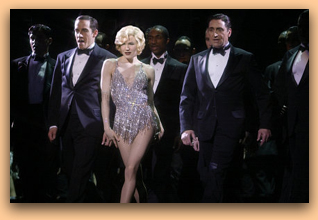
FEST2003
Chicago
Rob Marshall, director
Review by Rada Djurica
Knowing that Catherine Zeta-Jones won an Oscar for Best Actress in a Supporting Role, and that the film "Chicago" won Oscars for Best Picture, Best Film Editing, Best Costume Design, Best Sound, Best Art Direction, evidently, this film is worth seeing, and not only for the sake of Richard Gere or Catherine Zeta-Jones.
This is Rob Marshall's big-screen directing debut. For 30
years, Marshall worked mainly on stage. The movie "Chicago"
is a musical satire about sleaze, celebrity murderers and law in the unstable
'20s. Its origin was a true story that was the basis for a 1926 play by
Maureen Dallas Watkins, a reporter for the Chicago Tribune. The play was
made into a silent film in 1927 and into another film in 1942 called "Roxie
Hart," starring Ginger Rogers. When John Kander, Fred Ebb and Bob
Fosse turned it into a Broadway musical in 1975, it had a successful two-year
run. The musical was revived in a stripped down production, but with an
extra-hard edge, in 1996.
Miramax was impressed with the idea of turning a Broadway musical into
a film. Everyone knows movie musicals died decades ago, but Marshall splits
the material into two worlds -- reality for the story and surreality or
fantasy for the musical numbers. Perfect solution. And it proves the theory
that it is not important how serious and tragic a subject is, it is how
you present it. So the tragic story about a woman killing her lover and
ending up in the prison looks completely different when it's done as musical.
A serious subject is turned to light entertainment, with sexy clothing
and seductive choreography, also achieving commercial success. They've
been trying to do something like this since Liza Minnelli and Goldie Hawn
in the mid-'80s. Then it was Madonna, who with a swirl of fantasy around
a core of sweat and hard work, tried to demonstrate the concept of split
reality. Did the success of "Moulin Rouge" help the revival
of cabaret? Why shouldn't musicals be as much a part of popular culture
as action films?
The story centers on Roxie Hart (Renée Zellweger) who's a not-too-bright,
but cunning, ambitious blonde who wants to be a cabaret star. A furniture
salesman leads her on with false promises, knowing that she'll have an
affair with him. One night, after finding out that the man is using her,
she shoots him. Her adoring husband (John C. Really) tries to take the
blame for her, but she gets arrested and charged with murder. In prison,
she meets Velma Kelly (Catherine Zeta-Jones), a star of Chicago night-clubs
who is charged with killing her husband and twin sister in a jealous rage.
They are both assisted (for a price) by the prison matron (Queen Latifah)
and they both retain the same lawyer, Billy Flynn (Richard Gere). Flynn
is an expert at cultivating public opinion by manipulating the press.
"Chicago" benefits from a production that lasts 107 minutes,
with all its style and glitter, visually up-to-date with rapid cuts, angled
shots, and extreme close-ups that mainstream films picked up from the
MTV music videos. This film is a dark, cynical satire. " Chicago"
is a world where everything is measured in terms of money, where everything
can be bought, where sex is a commodity, and justice's scales are questionable.
The darkness of the theme is well presented with attitude -- nobody is
shy here about their amorality; everybody revels in naughtiness. When
Queen Latifah sings, the movie comes alive. Very smart idea! The screen
version of "Chicago," however, misses the hard, perverse edginess
that is highly effective with the Broadway version. Here the edges have
been rounded, the ironies softened, replaced with camera work and cutting.